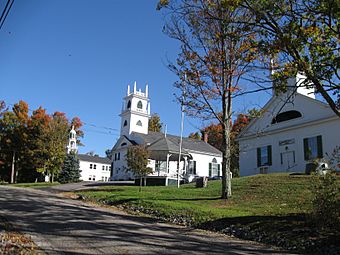Sanbornton Square Historic District facts for kids
Quick facts for kids |
|
|
Sanbornton Square Historic District
|
|
 |
|
| Location | Sanbornton, New Hampshire |
|---|---|
| Area | 680 acres (280 ha) |
| Built | 1748 |
| Architect | Multiple |
| Architectural style | Greek Revival, Federal, Cape Cod |
| NRHP reference No. | 80000417 |
| Added to NRHP | December 8, 1980 |
The Sanbornton Square Historic District is a special area in Sanbornton, New Hampshire. It's like a time capsule showing what the town center looked like long ago. This district is important because it helps us remember the history of Sanbornton.
The town of Sanbornton was officially started in 1748. It became a full town in 1777. Sanbornton is also known as the "mother town" for Franklin and Tilton. This means those towns were once part of Sanbornton. The land was first given out by a group called the Masonian proprietors. They were people who owned large areas of land in New Hampshire.
Unlike some older towns, Sanbornton didn't have a plan for its center. Instead, Sanbornton Square grew naturally. It became the main spot for town meetings and church life. This historic district was added to the National Register of Historic Places in 1980. This list helps protect important places in the United States.
Exploring Sanbornton Square
The Sanbornton Square Historic District is located along New Hampshire Route 132. It stretches between Tower Hill Road and Gulf Road. Some smaller roads also meet here. The western edge of the district is near Gulf Brook.
Buildings from the Past
You can find many old buildings in the district. The oldest part is the old cemetery. It is located at the northern end of the area. This cemetery has graves from the very early days of the town.
The main church and the town hall are also important. Both of these buildings were built around 1834. They have been central to the community for a long time. Another key building is the Woodman-Sanborn Academy. This school building was built in 1825. These three buildings are the most important public places in the district.
Most of the other buildings in the district are homes. Many of these houses were built in the late 1700s. Even more were built in the first half of the 1800s.
Architectural Styles You'll See
The houses in Sanbornton Square show two main building styles. These are the Federal style and the Greek Revival style.
- The Federal style was popular from about 1780 to 1830. Buildings in this style often look simple and balanced. They might have a fanlight window above the front door.
- The Greek Revival style was popular from about 1825 to 1860. These buildings often look like ancient Greek temples. They might have tall columns or wide, flat trim.
Most of these old buildings are made of wood. They have outer walls covered with overlapping wooden boards called clapboard siding. This type of construction was very common back then.
 | Emma Amos |
 | Edward Mitchell Bannister |
 | Larry D. Alexander |
 | Ernie Barnes |



